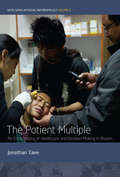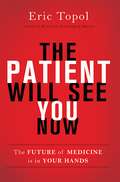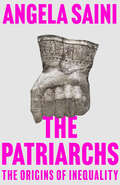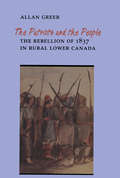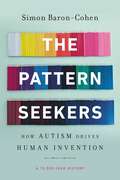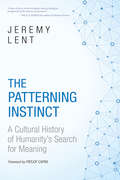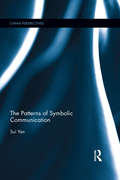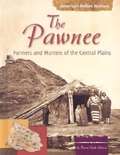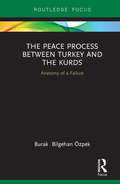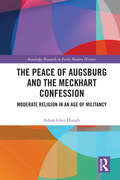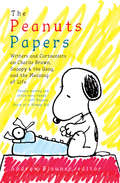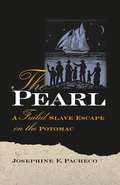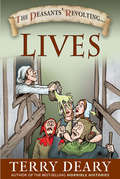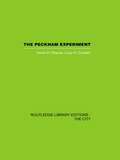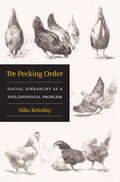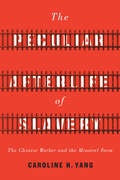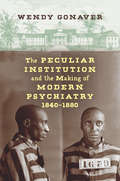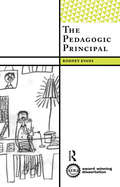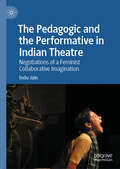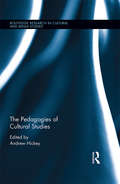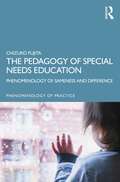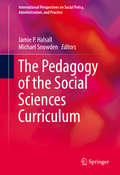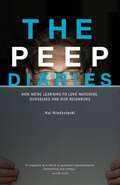- Table View
- List View
The Patient Multiple: An Ethnography of Healthcare and Decision-Making in Bhutan
by Jonathan TaeeIn the Himalayan Kingdom of Bhutan, medical patients engage a variety of healing practices to seek cures for their ailments. Patients use the expanding biomedical network and a growing number of traditional healthcare units, while also seeking alternative practices, such as shamanism and other religious healing, or even more provocative practices. The Patient Multiple delves into this healthcare complexity in the context of patients' daily lives and decision-making processes, showing how these unique mountain cultures are finding new paths to good health among a changing and multifaceted medical topography.
The Patient Will See You Now
by Eric TopolIn The Patient Will See You Now, Eric Topol, one of the nation’s top physicians, examines what he calls medicine’s "Gutenberg moment. ” Much as the printing press liberated knowledge from the control of an elite class, new technology-from the smartphone to machine learning-is poised to democratize medicine. In this new era, patients will control their data and be emancipated from a paternalistic medical regime in which "the doctor knows best. ” Mobile phones, apps, and attachments will literally put the lab and the ICU in our pockets. Computers will replace physicians for many diagnostic tasks, and enormous data sets will give us new means to attack conditions that have long been incurable. In spite of these benefits, the path forward will be complicated: some in the medical establishment will resist these changes, and digitized medicine will raise serious issues surrounding privacy. Nevertheless, the result-better, cheaper, and more humane health care for all-will be worth it. The Patient Will See You Now is essential reading for anyone who thinks they deserve better health care. That is, for all of us.
The Patient Will See You Now
by Eric TopolA trip to the doctor is almost a guarantee of misery. You'll make an appointment months in advance. You'll probably wait for several hours until you hear "the doctor will see you now"--but only for fifteen minutes! Then you'll wait even longer for lab tests, the results of which you'll likely never see, unless they indicate further (and more invasive) tests, most of which will probably prove unnecessary (much like physicals themselves). And your bill will be astronomical. In The Patient Will See You Now, Eric Topol, one of the nation’s top physicians, shows why medicine does not have to be that way. Instead, you could use your smartphone to get rapid test results from one drop of blood, monitor your vital signs both day and night, and use an artificially intelligent algorithm to receive a diagnosis without having to see a doctor, all at a small fraction of the cost imposed by our modern healthcare system. The change is powered by what Topol calls medicine's "Gutenberg moment. " Much as the printing press took learning out of the hands of a priestly class, the mobile internet is doing the same for medicine, giving us unprecedented control over our healthcare. With smartphones in hand, we are no longer beholden to an impersonal and paternalistic system in which "doctor knows best. " Medicine has been digitized, Topol argues; now it will be democratized. Computers will replace physicians for many diagnostic tasks, citizen science will give rise to citizen medicine, and enormous data sets will give us new means to attack conditions that have long been incurable. Massive, open, online medicine, where diagnostics are done by Facebook-like comparisons of medical profiles, will enable real-time, real-world research on massive populations. There's no doubt the path forward will be complicated: the medical establishment will resist these changes, and digitized medicine inevitably raises serious issues surrounding privacy. Nevertheless, the result--better, cheaper, and more human health care--will be worth it. Provocative and engrossing, The Patient Will See You Now is essential reading for anyone who thinks they deserve better health care. That is, for all of us.
The Patriarchs: The Origins of Inequality
by Angela SainiFor fans of Sapiens and The Dawn of Everything, a groundbreaking exploration of gendered oppression—its origins, its histories, our attempts to understand it, and our efforts to combat itFor centuries, societies have treated male domination as natural to the human species. But how would our understanding of gender inequality—our imagined past and contested present— look if we didn&’t assume that men have always ruled over women? If we saw inequality as something more fragile that has had to be constantly remade and reasserted?In this bold and radical book, award-winning science journalist Angela Saini explores the roots of what we call patriarchy, uncovering a complex history of how it first became embedded in societies and spread across the globe from prehistory into the present. She travels to the world&’s earliest known human settlements, analyzes the latest research findings in science and archaeology, and traces cultural and political histories from the Americas to Asia, finding that: From around 7,000 years ago there are signs that a small number of powerful men were having more children than other menFrom 5,000 years ago, as the earliest states began to expand, gendered codes appeared in parts of Europe, Asia, and the Middle East to serve the interests of powerful elites—but in slow, piecemeal ways, and always resistedIn societies where women left their own families to live with their husbands, marriage customs came to be informed by the widespread practice of captive-taking and slavery, eventually shaping laws that alienated women from systems of support and denied them equal rightsThere was enormous variation in gender and power in many societies for thousands of years, but colonialism and empire dramatically changed ways of life across Asia, Africa, and the Americas, spreading rigidly patriarchal customs and undermining how people organized their families and work.In the 19th century and 20th centuries, philosophers, historians, anthropologists, and feminists began to actively question what patriarchy meant as part of the attempt to understand the origins of inequality. In our own time, despite the pushback against sexism, abuse, and discrimination, even revolutionary efforts to bring about equality have often ended in failure and backlash. But The Patriarchs is a profoundly hopeful book—one that reveals a multiplicity to human arrangements that undercuts the old grand narratives and exposes male supremacy as no more (and no less) than an ever-shifting element in systems of control.
The Patriots and the People
by Allan GreerThe Lower Canadian Rebellion of 1837 has been called the most important event in pre-Confederation history. Previously, it has been explained as a response to economic distress or as the result of manipulation by middle-class politicians. Lord Durham believed it was an expression of racial conflict. The Patriots and the People is a fundamental reinterpretation of the Rebellion. Allan Greer argues that far being passive victims of events, the habitants were actively responding to democratic appeals because the language of popular sovereignty was in harmony with their experience and outlook. He finds that a certain form of popular republicanism, with roots deep in the French-Canadian past, drove the anti-government campaign. Institutions such as the militia and the parish played an important part in giving shape to the movement, and the customs of the maypole and charivari provided models for the collective actions against local representatives of the colonial regime. In looking closely into the actions, motives, and mentality of the rural plebeians who formed a majority of those involved in the insurrection, Allan Greer brings to light new causes for the revolutionary role of the normally peaceful French-Canadian peasant. By doing so he provides a social history with new dimensions.
The Pattern Seekers: How Autism Drives Human Invention
by Simon Baron-CohenA groundbreaking argument about the link between autism and ingenuity.Why can humans alone invent? In The Pattern Seekers, Cambridge University psychologist Simon Baron-Cohen makes a case that autism is as crucial to our creative and cultural history as the mastery of fire. Indeed, Baron-Cohen argues that autistic people have played a key role in human progress for seventy thousand years, from the first tools to the digital revolution.How? Because the same genes that cause autism enable the pattern seeking that is essential to our species's inventiveness. However, these abilities exact a great cost on autistic people, including social and often medical challenges, so Baron-Cohen calls on us to support and celebrate autistic people in both their disabilities and their triumphs. Ultimately, The Pattern Seekers isn't just a new theory of human civilization, but a call to consider anew how society treats those who think differently.
The Patterning Instinct: A Cultural History of Humanity's Search for Meaning
by Fritjof Capra Jeremy LentThis fresh perspective on crucial questions of history identifies the root metaphors that cultures have used to construct meaning in their world. It offers a glimpse into the minds of a vast range of different peoples: early hunter-gatherers and farmers, ancient Egyptians, traditional Chinese sages, the founders of Christianity, trail-blazers of the Scientific Revolution, and those who constructed our modern consumer society. Taking the reader on an archaeological exploration of the mind, the author, an entrepreneur and sustainability leader, uses recent findings in cognitive science and systems theory to reveal the hidden layers of values that form today's cultural norms. Uprooting the tired clichés of the science-religion debate, he shows how medieval Christian rationalism acted as an incubator for scientific thought, which in turn shaped our modern vision of the conquest of nature. The author probes our current crisis of unsustainability and argues that it is not an inevitable result of human nature, but is culturally driven: a product of particular mental patterns that could conceivably be reshaped. By shining a light on our possible futures, the book foresees a coming struggle between two contrasting views of humanity: one driving to a technological endgame of artificially enhanced humans, the other enabling a sustainable future arising from our intrinsic connectedness with each other and the natural world. This struggle, it concludes, is one in which each of us will play a role through the meaning we choose to forge from the lives we lead.From the Hardcover edition.
The Patterns of Symbolic Communication (China Perspectives)
by Sui YanWith the classic semiotician Roland Barthes' ground-breaking research of semiotics, symbols are liberated from linguistics and extended to media research, which makes semiotics increasingly important especially in the present-day world dominated by new media. In this book, the author offers an in-depth critique of the key theorizations of classic semiotics and clarifies some esoteric terminologies such as connotateur, isology, the metalanguage mechanism, the naturalization mechanism, etc. More importantly, combining semiotics with communication studies, the author proposes a number of innovative ideas, such as the leveraging communication, the collaborative communication, the rich variety of signifiers, etc. Besides, this book adds a practical dimension to semiotics studies by investigating diverse patterns of symbolic communication in the real world practices. It will help readers gain insights into the complexity of our life and society which depend on symbols for exchange and communication. This book will appeal to scholars and students of semiotics and communication. Readers who are interested in symbolic communication will also benefit from it.
The Pawnee: Farmers And Hunters Of The Central Plains
by Karen Bush Gibson Karen B. GibsonProvides an overview of the past and present lives of the Pawnee Native Americans, tracing their customs, family life, history, culture, and relations with the United States government.
The Peace Process between Turkey and the Kurds: Anatomy of a Failure (Routledge Focus on the Middle East)
by Burak Bilgehan ÖzpekIn January 2013, the Justice and Development Party (AKP) government initiated a peace process in order to settle the Kurdish question through peaceful means. However, this sanguine atmosphere gradually disappeared, before finally collapsing after the general elections of 7 June 2015. This book addresses the question of why the peace building attempts that culminated between 2013 and 2015 failed. It deals with the historical background of the Kurdish question and contemporary complexities of the Turkish politics to explain how they eventually jeopardized the peace process. This is an important and relevant research question because the Kurdish question has been viewed as a variable shaping Turkey’s domestic politics and its foreign relations. The Kurdish question's influence on Turkish foreign policy is not confined to its neighbors. Turkey's relations with the United States and the European Union was also shaped by the issues stemmed from the Kurdish question. As this was the first serious peace attempt in a conflict that lasted over three decades, examination of why it failed will inform any future attempts at peace and will help pinpoint the potential path that Turkey might face in both the domestic and international realm. This book will appeal to students and scholars with an interest in Turkey and the Kurdish issue, peacekeeping, security studies and Middle East Politics.
The Peace of Augsburg and the Meckhart Confession: Moderate Religion in an Age of Militancy
by Adam Glen HoughTaking the religiously diverse city of Augsburg as its focus, this book explores the underappreciated role of local clergy in mediating and interpreting the Peace of Augsburg in the decades following its 1555 enactment, focusing on the efforts of the preacher Johann Meckhart and his heirs in blunting the cultural impact of confessional religion. It argues that the real drama of confessionalization was not simply that which played out between princes and theologians, or even, for that matter, between religions; rather, it lay in the daily struggle of clerics in the proverbial trenches of their ministry, who were increasingly pressured to choose for themselves and for their congregations between doctrinal purity and civil peace.
The Peanuts Papers: A Library of America Special Publication
by VariousA one-of-a-kind celebration of America's greatest comic strip--and the life lessons it can teach us--from a stellar array of writers and artistsOver the span of fifty years, Charles M. Schulz created a comic strip that is one of the indisputable glories of American popular culture—hilarious, poignant, inimitable. Some twenty years after the last strip appeared, the characters Schulz brought to life in Peanuts continue to resonate with millions of fans, their beguiling four-panel adventures and television escapades offering lessons about happiness, friendship, disappointment, childhood, and life itself. In The Peanuts Papers, thirty-three writers and artists reflect on the deeper truths of Schulz’s deceptively simple comic, its impact on their lives and art and on the broader culture. These enchanting, affecting, and often quite personal essays show just how much Peanuts means to its many admirers—and the ways it invites us to ponder, in the words of Sarah Boxer, “how to survive and still be a decent human being” in an often bewildering world. Featuring essays, memoirs, poems, and two original comic strips, here is the ultimate reader’s companion for every Peanuts fan.Featuring:Jill Bialosky Lisa Birnbach Sarah Boxer Jennifer Finney Boylan Ivan Brunetti Hilary Fitzgerald Campbell Rich Cohen Gerald Early Umberto Eco Jonathan Franzen Ira Glass Adam Gopnik David Hajdu Bruce Handy David Kamp Maxine Hong Kingston Chuck Klosterman Peter D. Kramer Jonathan Lethem Rick Moody Ann Patchett Kevin Powell Joe Queenan Nicole Rudick George Saunders Elissa Schappell Seth Janice Shapiro Mona Simpson Leslie Stein Clifford Thompson David L. Ulin Chris Ware
The Pearl
by Josephine F. PachecoIn the spring of 1848 seventy-six slaves from the nation's capital hid aboard a schooner called the Pearl in an attempt to sail down the Potomac River and up the Chesapeake Bay to freedom in Pennsylvania. When inclement weather forced them to anchor for the night, the fugitive slaves and the ship's crew were captured and returned to Washington. Many of the slaves were sold to the Lower South, and two men sailing the Pearl were tried and sentenced to prison. Recounting this harrowing tale from the preparations for escape through the participants' trial, Josephine Pacheco provides fresh insight into the lives of enslaved blacks in the District of Columbia, putting a human face on the victims of the interstate slave trade, whose lives have been overshadowed by larger historical events. Pacheco also details the Congressional debates about slavery that resulted from this large-scale escape attempt. She contends that although the incident itself and the trials and Congressional disputes that followed were not directly responsible for bringing an end to the slave trade in the nation's capital, they played a pivotal role in publicizing many of the issues surrounding slavery. Eventually, President Millard Fillmore pardoned the operators of the Pearl.
The Peasants' Revolting Lives (The\peasants' Revolting Ser.)
by Terry DearyThe author of the Horrible Histories series tells the unpleasant truth about what the poor have endured in this sharp-witted, pull-no-punches book. British prime minister Benjamin Disraeli once described the rich and poor as &“two nations between whom there is no intercourse and no sympathy; who are as ignorant of each other&’s habits, thoughts, and feelings, as if they were dwellers in different zones, or inhabitants of different planets.&” Today we&’re well aware of the habits, thoughts, and feelings of the rich, because historians write about them endlessly. The poor, though, are largely ignored and, as a result, their contributions to our modern world are forgotten. Here, Terry Deary takes us back through the centuries with a poignant but humorous look at how life treated the ordinary people who scratched out a living at the very bottom of society. Their world was one of foul food, terrible toilets, danger, disease and death—the last usually premature. Wryly told tales of deprivation, exploitation, sickness, mortality, warfare, and religious oppression fill these pages—the teacher turned child-catcher who rounded up local waifs and strays before putting them to work; the agricultural workers who escaped the clutches of the Black Death only to be thwarted by lordly landowners; the hundreds of children who descended into the inky depths of hazardous coal mines. You&’ll discover ingenuity: how cash-strapped citizens used animal droppings for house building, how sparrow&’s brains were incorporated into aphrodisiacal brews, and how extra money was made by mixing tea with dried elder leaves—and learn how courtship, marriage, sport, entertainment, education, and, occasionally, achievement briefly illuminated the drudgery. The Peasants&’ Revolting Lives explores, commemorates, and celebrates the lives of those who endured against the odds. From medieval miseries to the idiosyncrasies of being a twenty-first-century peasant, tragedy and comedy sit side by side in these tales of survival in the face of hardship.
The Peasants' Revolting Lives (The\peasants' Revolting Ser.)
by Terry DearyThe author of the Horrible Histories series tells the unpleasant truth about what the poor have endured in this sharp-witted, pull-no-punches book. British prime minister Benjamin Disraeli once described the rich and poor as &“two nations between whom there is no intercourse and no sympathy; who are as ignorant of each other&’s habits, thoughts, and feelings, as if they were dwellers in different zones, or inhabitants of different planets.&” Today we&’re well aware of the habits, thoughts, and feelings of the rich, because historians write about them endlessly. The poor, though, are largely ignored and, as a result, their contributions to our modern world are forgotten. Here, Terry Deary takes us back through the centuries with a poignant but humorous look at how life treated the ordinary people who scratched out a living at the very bottom of society. Their world was one of foul food, terrible toilets, danger, disease and death—the last usually premature. Wryly told tales of deprivation, exploitation, sickness, mortality, warfare, and religious oppression fill these pages—the teacher turned child-catcher who rounded up local waifs and strays before putting them to work; the agricultural workers who escaped the clutches of the Black Death only to be thwarted by lordly landowners; the hundreds of children who descended into the inky depths of hazardous coal mines. You&’ll discover ingenuity: how cash-strapped citizens used animal droppings for house building, how sparrow&’s brains were incorporated into aphrodisiacal brews, and how extra money was made by mixing tea with dried elder leaves—and learn how courtship, marriage, sport, entertainment, education, and, occasionally, achievement briefly illuminated the drudgery. The Peasants&’ Revolting Lives explores, commemorates, and celebrates the lives of those who endured against the odds. From medieval miseries to the idiosyncrasies of being a twenty-first-century peasant, tragedy and comedy sit side by side in these tales of survival in the face of hardship.
The Peckham Experiment: A study of the living structure of society
by Innes H. Pearse Lucy H. CrockerFirst published in 2006. Routledge is an imprint of Taylor & Francis, an informa company.
The Pecking Order: Social Hierarchy as a Philosophical Problem
by Niko KolodnyA trenchant case for a novel philosophical position: that our political thinking is driven less by commitments to freedom or fairness than by an aversion to hierarchy.Niko Kolodny argues that, to a far greater extent than we recognize, our political thinking is driven by a concern to avoid relations of inferiority. In order to make sense of the most familiar ideas in our political thought and discourse—the justification of the state, democracy, and rule of law, as well as objections to paternalism and corruption—we cannot merely appeal to freedom, as libertarians do, or to distributive fairness, as liberals do. We must instead appeal directly to claims against inferiority—to the conviction that no one should stand above or below.The problem of justifying the state, for example, is often billed as the problem of reconciling the state with the freedom of the individual. Yet, Kolodny argues, once we press hard enough on worries about the state’s encroachment on the individual, we end up in opposition not to unfreedom but to social hierarchy. To make his case, Kolodny takes inspiration from two recent trends in philosophical thought: on the one hand, the revival of the republican and Kantian traditions, with their focus on domination and dependence; on the other, relational egalitarianism, with its focus on the effects of the distribution of income and wealth on our social relations.The Pecking Order offers a detailed account of relations of inferiority in terms of objectionable asymmetries of power, authority, and regard. Breaking new ground, Kolodny looks ahead to specific kinds of democratic institutions that could safeguard against such relations.
The Peculiar Afterlife of Slavery: The Chinese Worker and the Minstrel Form (Asian America)
by Caroline H. YangThe Peculiar Afterlife of Slavery explores how antiblack racism lived on through the figure of the Chinese worker in US literature after emancipation. Drawing out the connections between this liminal figure and the formal aesthetics of blackface minstrelsy in literature of the Reconstruction and post-Reconstruction eras, Caroline H. Yang reveals the ways antiblackness structured US cultural production during a crucial moment of reconstructing and re-narrating US empire after the Civil War. Examining texts by major American writers in the late nineteenth and early twentieth centuries—including Harriet Beecher Stowe, Bret Harte, Mark Twain, Ambrose Bierce, Sui Sin Far, and Charles Chesnutt—Yang traces the intertwined histories of blackface minstrelsy and Chinese labor. Her bold rereading of these authors' contradictory positions on race and labor sees the figure of the Chinese worker as both hiding and making visible the legacy of slavery and antiblackness. Ultimately, The Peculiar Afterlife of Slavery shows how the Chinese worker manifests the inextricable links between US literature, slavery, and empire, as well as the indispensable role of antiblackness as a cultural form in the United States.
The Peculiar Institution and the Making of Modern Psychiatry, 1840–1880
by Wendy GonaverThough the origins of asylums can be traced to Europe, the systematic segregation of the mentally ill into specialized institutions occurred in the United States only after 1800, just as the struggle to end slavery took hold. In this book, Wendy Gonaver examines the relationship between these two historical developments, showing how slavery and ideas about race shaped early mental health treatment in the United States, especially in the South. She reveals these connections through the histories of two asylums in Virginia: the Eastern Lunatic Asylum in Williamsburg, the first in the nation; and the Central Lunatic Asylum in Petersburg, the first created specifically for African Americans. Eastern Lunatic Asylum was the only institution to accept both slaves and free blacks as patients and to employ slaves as attendants.Drawing from these institutions' untapped archives, Gonaver reveals how slavery influenced ideas about patient liberty, about the proper relationship between caregiver and patient, about what constituted healthy religious belief and unhealthy fanaticism, and about gender. This early form of psychiatric care acted as a precursor to public health policy for generations, and Gonaver's book fills an important gap in the historiography of mental health and race in the nineteenth century.
The Pedagogic Principal (International Institute for Qualitative Methodology Series)
by Rodney EvansUsing an innovative research strategy including empirical, interpretive, and narrative strands, Rod Evans reorients studies of educational administration that have been dominated by organizational theory originating in the world of industry and commerce. Building on a foundation of pedagogical and phenomenological inquiry, he examines administrators’ concrete, lived experience, or “lifeworld practice.” In reconstituting educational administration as pedagogical practice, Evans draws conclusions with profound implications for schools and administrators of every stripe.
The Pedagogic and the Performative in Indian Theatre: Negotiations of a Feminist Collaborative Imagination
by Indu JainThis book foregrounds the realm of Contemporary Indian Feminist Theatre in order to explore the inter-relationships between feminist theatrical theory, practice and its historical antecedents. The study focuses on the performance processes, training methods and pedagogical vocabulary used by four Indian women directors: Anamika Haksar, Anuradha Kapur, Kirti Jain and Tripurari Sharma. The book interprets the feminist emphasis on process as extended into actor training and rehearsal dynamics, investigating its innovations as well as limitations, while examining how successful these director-pedagogues were in bringing gendered and radical feminist sensibilities to their work in classroom spaces.
The Pedagogies of Cultural Studies (Routledge Research in Cultural and Media Studies)
by Andrew HickeyThis volume provides an exploration of the manifold ways pedagogy is enacted in cultural studies practice. Pedagogy in the book comes to stand as far more than simply the "art of teaching"; contributors explore how pedagogy defines and shapes their practice as cultural studies scholars. Chapters variously highlight the role of pedagogy in cultural studies practice, including formal, classroom situations where cultural studies is deployed to teach as part of degree or coursework programs, but importantly also as something removed from the formal classroom, as situated within the research act via public engagement or through social activism as a public pedagogy. In so doing, the book chart a course for understanding cultural studies as an active and engaged discipline interested in understanding cultural flows and production as sites of learning and exchange.
The Pedagogy of Special Needs Education: Phenomenology of Sameness and Difference (Phenomenology of Practice)
by Chizuko FujitaThe Pedagogy of Special Needs Education: Phenomenology of Sameness and Difference outlines how to understand the inner and behavioral lives of children with intellectual disability through the psychology and phenomenology of "stories" derived from the experiences of living with these children. The book inquires into the meaning of the experiences of children with intellectual developmental disability using a phenomenological method. It examines how the external behaviors of children with special needs may look different from children without these needs but actually do share many similarities at the phenomenological level of lived experience. Themes of difference and sameness are employed for exploring the significances of phenomena such as "finger play," "eating as selffeeding," "smiling and turn-taking," "self-talk," and "don’t touch me." Throughout the narrating and interpreting of the case studies within the book, the author shows the tensional dialectic between individual and collective difference in order to understand what is required to help children with intellectual disability become themselves and form their personal self-identity. The Pedagogy of Special Needs Education can be used in schools, seminars, and courses related to special education programs and in special needs curricula for children with developmental disabilities. It can also support childcare professionals who carry orthopedagogical responsibilities and who are concerned about the wellbeing of children and their families experiencing special needs. Additionally, this book is valuable to students, researchers, teachers, and others interested in a hermeneutic phenomenological approach to human science, professional practice issues, and qualitative research methods.
The Pedagogy of the Social Sciences Curriculum
by Jamie P. Halsall Michael SnowdenThis far-sighted volume describes emerging trends and challenges in university-level social sciences education in an era marked by globalization, austerity, and inequity. It spotlights solution-focused and interdisciplinary methods of teaching, developed to match influential academic ideas, such as self-directed learning and learning in communities, as students seek to engage with and improve conditions in their immediate environments. Chapters offer real-world applications of foundational concepts in the modern practice of teaching, learning, and curriculum development. Accordingly, the editors emphasize the relationship between pedagogy and curriculum, as both are critical in encouraging student autonomyand promoting optimum academic and societal outcomes. Included in the coverage: · Towards a concept of solution-focused teaching: learning in communities. · Heutagogy and the emerging curriculum. · Collaborative working in the statutory and voluntary sectors. · Delivering a community development curriculum to students with multiple identities. · Photography and teaching in community development. · A model for change: sharing ideas and strategies. The Pedagogy of the Social Sciences Curriculum will inspire sociologists, social workers, and health and sociology educators to take a deeper role in community well-being as students, faculty, and communities collaborate to make lasting contributions to society.
The Peep Diaries
by Hal Niedzviecki"Take a peek at The Peep Diaries, an erudite (but not too erudite) look at the culture that Facebook, Twitter, et al. have spawned."--Real Simple "It's a great read; it mixes frank interviews with people pushing the boundaries of voyeurism and exhibitionism, alongside a bracing critique of the social context that got us into peep culture and the forces that now exploit our participation in it."--The Globe and Mail We have entered the age of "peep culture": a tell-all, show-all, know-all digital phenomenon that is dramatically altering notions of privacy, individuality, security, and even humanity. Peep culture is reality TV, YouTube, MySpace, Facebook, Twitter, over-the-counter spy gear, blogs, chat rooms, amateur porn, surveillance technology, Dr. Phil, Borat, cell phone photos of your drunk friend making out with her ex-boyfriend, and more. In the age of peep, core values and rights we once took for granted are rapidly being renegotiated, often without our even noticing. With hilarious, exasperated acuity, social critic Hal Niedzviecki dives into peep, starting his own video blog, joining every social network that will have him, monitoring the movements of his toddler, selling his secrets on Craigslist, hiring a private detective to investigate him, spying on his neighbors, trying out for reality TV shows, and stripping for the pleasure of a web audience he isn't even sure exists. Part travelogue, part diary, part meditation and social history, The Peep Diaries explores a rapidly emerging digital phenomenon that is radically changing not just the entertainment landscape, but also the firmaments of our culture and society. The Peep Diaries introduces the arrival of the age of peep culture and explores its implications for entertainment, society, sex, politics, and everyday life. Mixing first-rate reporting with sociological observations culled from the latest research, this book captures the shift from pop to peep and the way technology is turning gossip into documentary and Peeping Toms into entertainment journalists. Packed with stranger-than-fiction true-life characters and scenarios, The Peep Diaries reflects the aspirations and confusions of the growing number of people willing to trade the details of their private lives for catharsis, attention, and notoriety. Hal Niedzviecki is the editor of Broken Pencil magazine and has published numerous works of social commentary and fiction, including Hello I'm Special: How Individuality Became the New Conformity.
